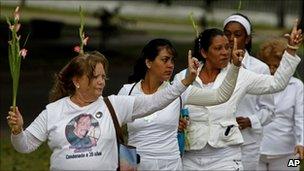Cuba urged to free more prisoners
- Published

The Ladies in White say the Cuban government has not kept its promise
Opposition activists in Cuba have accused the government of failing to keep its promise to free another 13 jailed dissidents.
President Raul Castro agreed in July to free 52 political prisoners within four months.
Most have been released into exile in Spain, but 13 are still in prison because they refuse to leave Cuba.
Relatives of prominent dissidents, known as the Ladies in White, protested in Havana to demand their release.
The activists said Sunday was the deadline by which all 52 prisoners should have been freed, in accordance with a deal struck between President Castro and the Catholic Church.
"They are deceiving and have played with the Church, the government of Spain, the European Union and with all the international community", said the Ladies in White leader, Laura Pollan.
"This is proof that their word has no value, and that they cannot be trusted," she said.
A Church official said they were surprised at the lack of progress regarding the prisoners.
"It is not what we thought would happen," Father Jose Felix Perez, secretary of the Cuban Conference of Bishops, told the Associated Press.
Prominent dissident Guillermo Farinas has not ruled out resuming a hunger strike if the 13 men are not freed.
Mr Farinas, who last month was awarded Europe's Sakharov human rights prize, ended a long hunger strike in July when the government announced it was freeing the prisoners.
Counter-revolutionaries
Cuba's communist government has never publicly discussed a deadline for the releases.
It considers the prisoners to be counter-revolutionary "mercenaries" working for the US.
But it agreed to free them in a deal brokered by the Church and the government of Spain, which said it would receive them.
The government has also released or promised to release another 14 prisoners who were not part of the group of 52, including some who were convicted of violent crimes.
The 52 were imprisoned in 2003 in a crackdown on opposition activists, government critics and commentators.
Their wives, daughters and mothers formed the Ladies in White group to campaign for their release.
Under Cuban law, dissidents can be arrested, tried and jailed for speaking and writing against the government under charges such as enemy propaganda, clandestine printing and unlawful association.
- Published22 October 2010
- Published22 October 2010
- Published10 October 2010
- Published13 July 2010
- Published9 July 2010